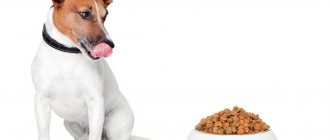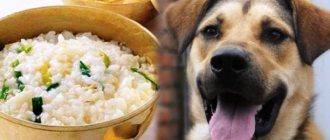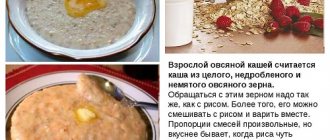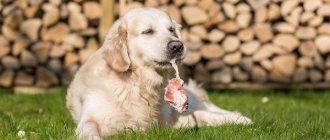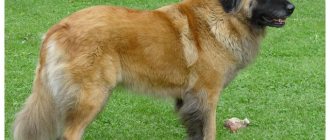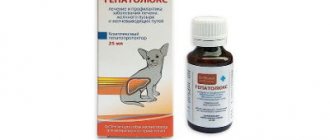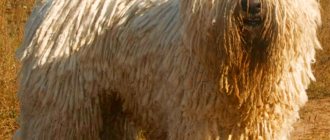Yorkshire Terriers are one of the smallest dogs in the whole world. Recently, the fashion for them has spread to many corners of the Earth, and more and more people are trying to have such a baby in their home. This is not surprising - they are sweet, energetic and affectionate.
They love adventure and are courageous, inquisitive and playful. They are loyal to their owner and will fearlessly protect him, despite their size. They are convenient to keep in an apartment; you don’t have to take them for walks every day - it is possible to teach a puppy to go to the cat litter box. It's fun to go outside with them in the cold season - a variety of overalls for both girls and boys make this activity interesting. They are also interested in doing their hair – you’ve probably seen charming beauties with bright bows and clips on their bangs. In general, solid advantages. But what should we serve such a miracle? Let's first understand the characteristics of the breed.
Which one is possible?
What dog cereals can, and most importantly, should be given to kids? Buckwheat, oatmeal and rice cereals are most suitable for puppies ; they can also be mixed and cooked together.
When considering the question of what cereals can be fed to dogs, do not forget that they all contain phytic acid , which binds calcium, magnesium, phosphorus, zinc and other trace elements, which makes their absorption in the intestines impossible.
However, there is a simple solution: phytic acid is partially destroyed during cooking and soaking. If you soak the cereal overnight and boil it for about twenty minutes, there won’t be much harm .
IMPORTANT ! In any case, it is necessary to carefully monitor the reaction of the pet’s body: some dogs experience allergic reactions.
Points about feeding the Yorkshire Terrier
Dogs of this breed are demanding creatures. This applies to many issues, including their eating habits. It is the proper nutrition that determines what an animal looks like, what kind of fur and teeth it has. After all, the Yorkshire Terrier is famous for its silky coat. If a pet eats poorly, it is unlikely to look beautiful.
Yorkshire Terriers are different from other dog breeds. This animal is selective in food; it is unlikely that a Yorkie will pick up scraps under the master’s table. Here you have to sit down and think through the menu. The food that humans eat can cause digestive problems in dogs.
Many dogs require their owners to hand feed them. And they will strive for this for a long time and stubbornly. This suggests that the Yorkie was raised incorrectly and was not taught obedience. Although animals love their owners and may well stand up for them.
Each dog is a creature with its own character. The appearance of the animal will also depend on it. If a Yorkie has a good-natured character, he is active and playful, then he usually has a lean texture. Phlegmatic dogs can become obese because they eat a lot of food and exercise little.
Here a lot depends on the owner of the animal. You need to monitor the dog and correct his behavior. Don't allow yourself to overeat uncontrollably. In this case, add less feed. If the dog doesn’t move much, take him for a walk more often, where he can run and play.
Basic nutrition rules
Yorkie owners need to monitor their diet and plan it wisely:
- Do not feed your dog food enriched with protein, as this can lead to kidney failure. If your pet is too sensitive, protein compounds may cause it to rash. The animal may suffer from allergies;
- The nutritional process should not develop into a cult. You should not feed your animal only dry or natural food. Food must be extremely balanced. Add mineral additives to the feed in permissible proportions, avoiding their excess;
- The food should be easily digestible, without causing digestive problems.
How often?
- 2-3 months: fed six times a day: every three hours, starting at about seven in the morning and ending at nine to ten in the evening.
- 2-4 months: four to five times a day, increasing the interval between feedings.
- 4-6 months: three to four times a day, every five to six hours.
- 6-10 months: three times a day, every six to seven hours.
- older: twice a day, morning and evening, like adult dogs.
At 1-2 months, meat or fish is given once a day; twice - porridge with water, meat or vegetable broth, with the addition of vegetables and meat; once - milk, cottage cheese or kefir; the remaining two times you can give dairy products or oatmeal cooked in milk.
The time of one feeding is about 15-20 minutes. If there is any food left in the bowl after this, it should be removed.
IMPORTANT ! Before giving your puppy physical activity, you must wait 1-2 hours after eating. Excessive activity on a full stomach can seriously harm your pet's health.
It is also useful to install a stand for bowls at the level of the puppy's chest: you can make it yourself or buy it. The tripod stand will last a long time because it allows you to adjust the height as the animal grows.
When to give eggs and when not to give?
Owners of dogs who have liver problems and general obesity are afraid to give their dog eggs - and quite rightly, the liver does not tolerate excess cholesterol, so only diet and low fat content in food will save the dog in this case.
In addition, before giving your dog an egg, you should be sure that your four-legged ward’s pancreas is normal. However, if the doctor says that eggs can definitely be given to a dog, do not rush to feed them after suffering from pancreatitis or liver diseases. The diet should continue to be followed, and eggs should be given less often - let the dog rely on low-fat meat and cereals. Ideally, after problems with the liver and pancreas, veterinarians recommend switching the animal to specialized food.
Is it possible
Both puppies and adult dogs are strictly advised not to eat certain grains, as they can cause indigestion, metabolic disorders, allergic reactions and other serious health problems.
Dairy
Compatibility test: can a dog have milk and fermented milk products? Artificial feeding of a puppy: substitute
Hercules
Let's turn to oatmeal. Oatmeal is high in calories, it has more fiber, protein, fat, calcium and phosphorus than rice and buckwheat. However, it is worth noting that it is only suitable for active dogs: castrated and sterilized animals are not allowed to give oatmeal . But for those who actively run and jump, it is possible.
In some dogs, oatmeal causes intestinal upset - this is individual and, of course, it is better to exclude it from the diet. But for dogs suffering from gastritis and stomach ulcers, oatmeal broth or jelly is very useful. Weakened, sick animals, pets on a diet, and growing puppies will only benefit from oatmeal.
“I’ll cook everything for myself”
Can a dog eat oatmeal? It is possible if this dog eats oatmeal all its life, does not get fat from it, and its intestines cope.
Is it necessary to specifically switch the dog to oatmeal porridge? No.
In any case, oatmeal, like any other cereal, requires correction and can be given within certain limits, without replacing meat with it.
Manna
Many people are interested in the question: is it possible to feed semolina porridge to babies? In fact, semolina is used mainly for those puppies (from newborns to a maximum of 3 months) who need to gain weight.
It is very high in calories, but it contains almost no vitamins and microelements (only a little potassium and iron), a small dose of fiber (only 0.2%), but a large amount of B vitamins.
Semolina is also allowed on the recommendation of a veterinarian in the treatment of gastrointestinal diseases. It is sometimes allowed to give it to older puppies, but in moderation.
Millet
Millet is too difficult to digest and can even cause intestinal volvulus. In addition, millet can cause severe allergies! Even mixing with other cereals is undesirable.
Pearl barley
Pearl barley , which is an allergen, is also contraindicated And despite the fact that barley contains a lot of vitamins, the body of a dog, especially a puppy, cannot even absorb a third of them. In addition, eating pearl barley porridge leads to constipation and even allergies in dogs.
Legumes are undesirable - they often cause bloating. It is strictly forbidden to give porridge made from corn grits , it is also practically not digestible in a dog’s stomach. Corn may be fresh or cooked on the cob.
Wheat and barley porridge can only be consumed by adult and healthy dogs leading an active lifestyle..
Can dogs eat buckwheat?
Breeders sometimes doubt whether this cereal can be given to dogs.
It is worth knowing that porridge normalizes metabolism, improves the functioning of the cardiovascular system, promotes weight loss, improves immunity, strengthens teeth and bones. It is prescribed during the recovery period after surgery.
This cereal is included in the dog's menu. The pet's daily diet consists of 35% cereals and 65% other products. When the balance is disturbed, the animal develops health and development problems.
Depending on the breed
German Shepherd
Porridge should make up 25-35% of the total diet. You can give buckwheat, rice and oatmeal porridge. They are usually supplemented with meat and vegetables.
Mom-Dad, thank you for the delicious porridge!
Husky
Steam oatmeal flakes with boiling water and let steep for 10 minutes. It is not recommended to give oatmeal often, because... it weakens, but can easily be replaced with rice or buckwheat. Add raw yolk, a little raw minced meat and cottage cheese - voila, breakfast is ready!
Malamute and Husky: 12 differences with clear photos
Labrador
The following recipe is useful for Labrador puppies: steam finely ground oatmeal with milk, add 1 tsp. fish oil and 2 glucose tablets. You can also cook buckwheat with meat in vegetable broth.
“Can I have some more porridge?”
Devoted friends Golden Retriever and Labrador: 5 differences
York
For Yorkies (as well as Shitzus, toy terriers and pugs), oatmeal and semolina are unacceptable, because... These dogs are prone to obesity. To prepare a delicious porridge for your Yorkie, take a small carrot, a little cauliflower, and 2 tablespoons of buckwheat. Cook everything until tender (about 30 minutes), then mix the resulting dish with a blender, add a little unrefined vegetable oil, boiled beef or chicken and serve the porridge to the dog. There should be no salt and pepper!
Calculate a serving of cooked porridge as follows: 500 grams. pet's weight - 1 tablespoon of porridge.
Industrial dry food
You can feed your Yorkshire Terrier dog dry food marked “for dwarf” or “small” breeds. They have a special kibble shape that allows you to remove plaque and help your dog not gain excess weight, thanks to its balanced composition. The best food for Yorkies is represented by a line of at least premium class.
In addition to croquettes, your Yorkie's diet can be varied with wet food. It is preferable to use spiders of the same brand as the dry food.
For adult Yorkies
The following brands are suitable for feeding dogs over 1 year of age:
- Monge Mini Adult.
- Acana Adult Small Breed.
- Ava Fresh Meat Adult Small.
- Pro Plan Optiderma Small & Mini.
- Royal Canin Yorkshire Terrier Adulto.
Information on how much to feed can be found on the product packaging. Feeding rates may vary from manufacturer to manufacturer due to composition.
For puppies and nursing bitches
The following brands of dry food can be given to your Yorkie puppy:
- Monge dog mini - specially designed for small breeds of dogs under 1 year of age. It can also be used for nursing Yorkies. The food consists of 42% chicken meat. Cereals contain rice and a small amount of corn.
- Brit Care Mini Puppy is a grain-free diet for puppies from 2 weeks to 10 months, pregnant and postpartum bitches. Lamb meat is one of the main ingredients of the feed.
- Royal Canin Starter is ideal for complementary feeding during the weaning period of puppies. Recommended for pregnant bitches in the third trimester and during the period of feeding cubs.
At first, it is recommended to soak dry food for puppies with a small amount of boiled water.
For sterilized pets
After sterilization and castration, it is recommended to feed the terrier kibble with a reduced amount of calories. The following brands are used for feeding:
- Brit Care Mini Light & Sterilized.
- Pro Plan Optiweight Small&Mini Light Sterilized.
- Royal Canin Neutered Adult Small Dog.
Food for sterilized Yorkies not only helps control weight, but also prevents the development of urolithiasis in the dog.
For allergy sufferers
For Yorkies with sensitive digestion and prone to allergies, the following brands are recommended:
- Brit VetDiets Dog Hypoallergenic
- Royal Canin Hypoallergenic
- Farmina Cibau Sensitive Fish
- Hill's Science Plan Sensitive Stomach & Skin.
The food prevents digestive disorders and maintains healthy coat and skin.
For dogs over 7 years old
After 7-8 years, Yorkies are considered elderly. Suitable for this category of dogs:
- Hill's Science Plan Dog Adult Small & Miniature;
- Royal Canin X-Small Adult 8+
- Monge Daily Line.
Kibble for senior dogs helps maintain dental, musculoskeletal, and digestive health.
How to cook: recipes
Ready-made porridge with broth can be stored in the refrigerator for up to 48 hours. You can also cook cereals, vegetables and meat separately and mix them before giving it to the puppy. In this case, the porridge is cooked in clean water without salt or additives, after cooking it is cooled, transferred to a clean container and stored in the refrigerator.
Any cereal, except oatmeal, should be well-cooked, but not paste-like, but crumbly . After cooking, leave the porridge tightly closed and let it brew for half an hour.
Oatmeal is not boiled, but steamed in boiling water. Be sure to wash the grains with running water before cooking.
Boiled fish is cleaned of bones and chopped; the meat is better digested when cut into cubes. Vegetables are also cut into cubes or grated.
Raw vegetables and meat are placed in the porridge 3-5 minutes before readiness; offal is cooked in advance in a separate broth, which is then not used. Ratio of cereal and water: 1 to 2 or 1 to 3.
IMPORTANT ! If minced meat is used instead of meat to prepare the broth, it should first be filled with water, stirred and left for a few minutes. Then remove the floating fragments of fat and skin.
Recipes for how to cook porridge for your pet:
Buckwheat in broth
- Place the meat in boiling water and cook over low heat until the meat is completely cooked, skimming off the foam regularly. Cooking time depends on the quality of water and meat and can take from 40 minutes to 2 hours. Remove the meat.
- Pre-soak the buckwheat in water for 20–30 minutes, drain off the floating husks, and place the grains in a sieve. Add buckwheat to the boiling broth in a ratio of 1:3, after boiling, cook for 15-20 minutes, stirring.
- 3-5 minutes before the cereal is ready, diced raw meat or vegetables.
- Bring to readiness, mix thoroughly, cover and leave for 20-30 minutes. You can cover the pan with a towel.
- Before eating, add a little butter or vegetable oil or fish oil to the prepared warm porridge.
On the water
- Pour the washed cereal with water in a ratio of 1:2 or so that the water level is two fingers higher than the level of the cereal, cover the pan with a lid and cook until the liquid has completely evaporated, 15–20 minutes after boiling.
- Cover the pan with a towel and leave to steep for 20–30 minutes. If you use unpolished rice to prepare porridge, you should cook it for 35-40 minutes.
- If the cereal is polished, you can add a teaspoon of sunflower or olive oil to the water before boiling.
Rice with milk
Pour the washed cereal with milk in a ratio of 1:2, add a teaspoon of vegetable oil. After boiling, cover tightly with a lid and cook for 20-30 minutes. Turn off the heat and leave on the hot surface for another 5-10 minutes, then open the lid and stir.
IMPORTANT ! The food must be warm; you cannot feed the puppy hot or cold!
Possible additives
Milk
Dairy products are the most important nutritional element for puppies, especially under three and a half months of age. You can cook cereals in milk, or you can cook them in water, low-fat meat or vegetable broth.
Milk, kefir, yogurt, cottage cheese or yogurt should be added to ready-made porridge with water or milk or fed separately. Also add pieces of vegetables and fruits, berries, nuts to the porridge, and add a teaspoon of honey.
Meat
It is possible and healthy to feed your puppy veal, beef, veal, lean lamb, rabbit and turkey meat, horse meat , cook and mix meat by-products such as heart, kidneys, lungs, and liver with porridge and vegetables.
Chicken should be added to the diet carefully and carefully monitor how your pet’s stomach reacts to it.
The meat must be frozen for two or three days and defrosted to room temperature before feeding.
Instead, you can also pour boiling water over it, put it in the porridge a few minutes before it’s ready and boil it a little, leaving it half-baked. For broth, it is best to use bones rather than meat, which are then removed. Meat by-products can be processed in the same way as meat, but it is preferable to boil them.
IMPORTANT ! Poultry meat must be separated from the bones and added to the porridge; giving bones is strictly prohibited.
Fish
Sea fish can be fed raw or in the same way as meat, but river fish must be processed to eliminate the risk of infection with parasites. First, you must remove all the bones from the fish or boil and grind it along with them.
Vegetables
Vegetables in porridge are placed finely chopped, raw, boiled, steamed, sometimes lightly fried, either one type or several at once. These can be beets, white and cauliflower cabbage, broccoli, bell peppers, cucumbers, zucchini, carrots, as well as greens in moderate quantities: lettuce, dill, sorrel, parsley, beet tops, cereal sprouts, etc.
IMPORTANT ! Vegetables and fruits should be washed, vegetables should be peeled. Nettle must first be doused with boiling water.
Fats
1-2 times a week you should add a hard-boiled chicken egg or a raw yolk without white.
Starting with a few drops and gradually increasing to a teaspoon, you can add vegetable oil, and from two months of age - fish oil. Also add crushed chalk or eggshells to the porridge (it should be crushed especially carefully to prevent the ingress of sharp particles), and a little butter.
IMPORTANT ! It is forbidden to give puppies fatty meat, pork, minced meat, and smoked meats. You should also not add sugar or sweets, since dogs cannot digest glucose and can cause fermentation in the intestines. Hot foods and spices can irritate the stomach, and sausages contain many harmful substances.
Pasta is allowed, infrequently and in moderation.
You should teach your puppy to eat a variety of foods. If the puppy has a predilection for something specific, this should be taken into account, and for the rejected food, take a break for a week or two. Sometimes you can add salt, but not a lot and not often: salt itself is found in all foods.
Each new product should be introduced into the diet gradually and monitor the intestinal reaction and possible allergic skin reaction. If necessary, a break is taken.
IMPORTANT! Dry food should not be mixed with porridge or other natural products.
Briefly about the main thing
- In addition to the obligatory meat, a dog’s diet may contain cereal products;
- The most useful and beneficial for the digestive tract are buckwheat and rice;
- Semolina, millet, corn and pearl barley porridge are not healthy food for your pet;
- The basis of a portion of food is meat, cereals are used as an additive;
- Pasta is completely unhealthy and, if consumed frequently, will harm the dog’s health;
- Boiled pasta from durum wheat can be given once a week, in the form of a small portion, with the obligatory addition of protein foods.
The ratio of cereals and additives. How much per day to give?
The portion is calculated according to the age and weight of the puppy, and then it is monitored whether he is full or not. If the pet willingly ate everything and licked the bowl, next time increase the amount of food given. Some animals do not leave anything, even when they are full, you should not allow them to overeat.
The total amount of food per day is 5% of the puppy’s weight; at the age of up to 4 months, another 100 g is added for 1 month of life.
- 1-2 months: cereals and vegetables should make up 10% of the food volume.
- 2-3 months: 15-25% cereals and vegetables, 35-50% meat and 40-50% dairy products.
- from 4 months: meat consumption increases, and other products decreases: the diet consists of 10-15% of cereals and vegetables, 25-50% of dairy products and 50-70% of meat.
Increasing the ratio of one at the expense of the other is inappropriate, including for the purpose of saving.
The amount of meat is calculated based on the requirement of 20-30 g per day per kg of puppy weight. Twice a week, instead of meat, fish should be given, 40-60 g per kg of weight.
Per 1 kg of weight:
- 1.5 g fiber
- 9 g protein
- 13.8 g carbohydrates
- 2.64 g fatty acids.
A third of the daily meat ration is added to the porridge; the rest should be fed raw.
The cooking ratio is:
- 30% cereals
- 40% meat, meat by-products or fish
- 30% vegetables and feed additives.
If it so happens that a feeding was missed, during the next feeding the usual portion is given, without additives. The same applies to the temporary replacement of some products with others. If at some time your pet is given meat porridge instead of milk, there is no need to then try to make up for the missed meal with additional portions or “replace it the other way around”: you should just continue to feed it as before.
IMPORTANT ! The puppy must have fresh water at any time of the day.
Puppies and the egg question
At what age can puppies be given egg products, whether thermally processed or raw, should be checked with a doctor, based on the specific breed and age, as well as the current feeding regimen of the animal.
In short, yes, you can.
However, the best food for a puppy for the time being is the bitch’s milk.
Well, whether a puppy can have a boiled egg, his mother, who has run out of milk or has eclampsia, will not tell her, so the person will have to determine the proportion of eggs in milk feeding. The relevant information is available on specialized websites where you can get advice from breeders of a particular breed.
Only after a detailed examination of the baby’s diet is it concluded whether it is possible to give the puppy a boiled egg, and again only experienced breeders can give advice that will definitely not harm or spoil the baby’s digestion.
Summing up
- Porridge is an important part of a puppy's diet.
- Buckwheat, rice and oatmeal cereals are most suitable for puppies.
- Bowls with food and water should be placed at chest level so that the puppy does not have to bend over while eating and drinking.
- High physical activity should be developed no earlier than after 1-2 hours.
- The puppy’s diet should be varied and complete; one food cannot be replaced with another to the detriment of nutritional value and vitamins.
- Food should always be warm and fresh.
- It is important to know which foods can be consumed by puppies, which by adult dogs, and which should not be included in the diet at all.
- It is necessary to ensure that the puppy does not remain hungry or overeat.
- Your puppy should always have access to clean, fresh water.
So, after reading this article, you can now determine what and how to feed your little four-legged friend so that he grows up healthy and cheerful. And surely you have your own personal experience and opinion that you would like to share, your stories and photos of your pets? We are waiting for your comments.
List of foods that should not be given
It may seem like there are foods on this list that no one would ever think of giving to a dog. But there are cases when a Yorkie was poisoned by products from this list because of his curiosity or the stupidity of some people:
- no sweets;
- salted and smoked products;
- mushrooms;
- grapes and raisins;
- yeast, yeast and flour products;
- tea and coffee;
- chocolate;
- lamb, pork;
- onions in any form;
- alcohol;
- raw fish;
- bones and stones;
- citrus;
- raw eggs.
The list can be expanded further, but it’s easier to remember what to feed your Yorkshire terrier, you can’t make exceptions to the rules, and the dog will always receive nutritious food in feeding.
